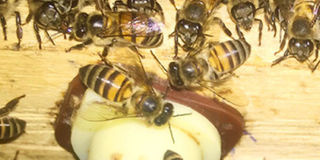Love for bees sweetens Turner’s life

After a 50-kilometre drive from Kampala, Seeds of Gold team arrive at Simon Turner’s bee farm in Wobulenzi, Luweero District which he named Malaika Honey.
The village is littered with dozens of acacia trees, which are drought-resistant, among other indigenous vegetation, making it a perfect site for beekeeping as the insects love the plants for nectar.
We find Turner, wearing his protective clothing smoking the hives to calm down the honey bees.
“The first harvest normally starts around March,” says Turner, who established the business in 2006. “This is what I am working on,” he adds.
How he started
Turner, an Australian, was working for a trading company in the United Kingdom (UK). He was sent to Uganda to buy 20 metric tonnes of honey which he could not get.
He saw a social business opportunity that motivated him to start Malaika Honey, to trade in honey.
“Beekeeping is easy to set up, especially in rural areas where there is plenty of natural vegetation,” says Turner, who began the project in 2006 with an initial capital of Shs10m.
“I used part of this money as my capital. The money helped me to establish farms in Luweero, Arua and Gulu,” he says.
This meant galvanising through creating jobs for rural communities too. The enterprise works with more than 3,000 farmers currently supplying Malaika with raw honey on an annual basis.
Under what arrangement do you work with farmers? I ask.
“Farmers register with us and they can supply. We also offer discounts on equipment sales and free advice to them so they boost their production levels. Currently we have two outreach centres, in Arua and Gulu but would like to expand on this so we can bring good markets to farmers,” he explains.
The beekeeper has employed several youths, who help him in making beehives, harvesting and packaging honey before it is distributed to buyers in major towns including Kampala. He makes an average of 200 beehives a month, which he sells at Shs30,000 each.
Training others
He has trained many people who have since established their own apiaries. Jimmy Odongo is one of the youth who benefited from the trainings.
Odongo says he got interested in beekeeping when he worked for a short time with an NGO in Gulu, whose one project was beekeeping. He picked up lessons there on bee farming and making hives.
Nancy Cardoza, an apiary agronomist and director at Northern Ugandan Women and Children Support Initiative (NUWOCSI), says honey is composed of 40 per cent fructose, 40 per cent glucose both natural sugars and about 18 per cent water, so there are many ways to tell if honey is pure or not.
“Fake honey dissolves easily in water while pure honey has a denser texture that settles at the bottom of water. The colour of honey depends on the nectar bees used — it can be brown or dark brown,” she says, adding that through agribusiness, young people can create jobs for themselves and others.
“We added a great deal of value in the sector as we are at the forefront of research and development of beekeeping. I have also written a practical guidebook in beekeeping. In that we explain many techniques we have developed here over the years.”
To ensure quality stands, the agricultural entrepreneur says they weigh and grade the honey. He adds, “We have regular suppliers so we know what to expect in terms of nectar source and honey quality. With our training we improve farmer standards in harvest and post-harvest handling particularly.”
Future
In terms of growth and expansion, his wish list includes working on queen bee rearing on the farm. With young productive queens in the beehives, the company will be able to increase its honey production by 50 to 80 per cent.
“Queens which are more than two years old don’t lay enough eggs to build strong colonies for honey production. I hope to expand this aspect of our business together with research and design in techniques coupled with teaching. I have developed good relationships with Australian beekeepers who are the best in the world and would love to develop a learning exchange program for farmers here to benefit,” he says.




